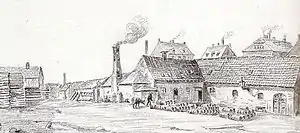Joseph Hambro | |
|---|---|
 | |
| Born | 4 November 1780 Copenhagen, Denmark |
| Died | 3 October 1848 (aged 67) London, England |
| Nationality | Danish |
| Spouse | Marianne von Halle |
| Children | Carl Joachim Hambro |
| Parent(s) | Calmer Hambro Thobe Levy |
| Relatives | Wulf Levin von Halle (father-in-law) Everard Hambro (grandson) |
Joseph Hambro (4 November 1780 – 3 October 1848) was a Danish merchant, banker and political advisor.
Early life
Joseph Hambro was born in 1780 in Copenhagen, Denmark.[1] His father, Calmer Hambro, was a Jewish silk and textile merchant, who was born in Rendsburg.[1] At the age of 17, Hambro came to Hamburg where he received his education at Fürst, Haller & Co.
Career
Hambro was a merchant and banker.[1] In 1800, he joined his father's bank and renamed it C. J. Hambro & Son.[1] Under his leadership, the bank gave loans to the Danish government from 1821 to 1827.[1]

In circa. 1830, he acquired Bodenhoffs Plads in Christianshavn, from then on known as Hambros Plads, establishing both a rice mill with Denmark's first steam engine, the country's first canned food factory and a bakery at the site.[2]
Hambro became an advisor to Johan Sigismund von Møsting, who served as the Danish Minister of Finance.[1]
Personal life

He was married to Marianne von Halle (1786–1838), the daughter of Wulf Levin von Halle, a merchant from Copenhagen.[1] They had a son, Carl Joachim Hambro, who moved to London, England, where he founded the Hambros Bank in 1839.[3]
He died in 1848 in London, where he had moved earlier that year.[1][3]
References
- 1 2 3 4 5 6 7 8 Andrew St George, 'Hambro, Baron Carl Joachim (1807–1877)', Oxford Dictionary of National Biography, Oxford University Press, 2004 accessed 6 May 2015
- ↑ "Hambros Plads" (in Danish). hovedstadshistorie.dk. Retrieved 27 January 2017.
- 1 2 "Hambro". Store norske leksikon (in Norwegian). Oslo: Kunnskapsforlaget. Retrieved 29 April 2011.